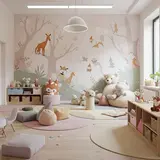Teaching for the Future: What the Opal School Can Teach Us About Education

The Opal School, in Portland, Oregon, has created some buzz in the education sphere. Their learning model prioritizes child-led learning, along with deep engagement in meaningful projects. It’s an approach that, ideally, nurtures creativity and a love of learning for the long-term, preparing students for success in a rapidly changing world. The school’s focus on social-emotional learning and strong teacher-student relationships is the foundation of a supportive environment where all children can thrive. The Opal model can provide valuable insights and strategies to enhance our own teaching practices, in our own districts.
For instance, how can teachers create a classroom environment that encourages and supports spontaneous writing during play? Writing is a cross-discipline skill that requires reinforcement at every stage.
In “Playing With Story Workshop in the Literacy Classroom,” researchers Kimberly Lenters, Ronna Mosher, and Stacey Hanzel explore the use of Story Workshop as a play-based approach to writing instruction for first-grade students. Their article appears in The Reading Teacher, and you can read it in its entirety through the link below. Rooted in the Opal School model, Story Workshop blends art and writing to support early literacy development. While this approach is common in kindergarten, it is often overlooked in first grade, when classrooms shift toward more structured literacy instruction. The authors examine how Story Workshop can provide a scaffolded and differentiated method for helping young children develop writing skills.
The researchers present two classroom case studies, this time in Canada, where teachers successfully adapted Story Workshop. Ms. Day, a first-grade teacher, integrated play-based storytelling into her literacy block, guiding students through a structured process of imagining, planning, playing, writing, drawing, and sharing. Her approach helped students transition from simple descriptions of their play to more detailed narratives. Ms. Marina, a learning commons teacher, incorporated Story Workshop into her literacy instruction with flexible materials and varied entry points, allowing students to shift between building, drawing, and writing as they developed their stories. Both teachers found that this approach enhanced student engagement and supported differentiated learning.
Story Workshop has some key benefits, including its potential to bridge play and writing, and encourage creativity. But it does create some practical challenges: storage, material organization, and time constraints can make implementation difficult. Despite these barriers, which can be addressed with support from both parents and administrators, Story Workshop offers a valuable way to support literacy development by honoring children's natural storytelling abilities and integrating imaginative experiences into writing instruction.
The focus on child-led learning is not without its critics. Education does rely on structure, along with the transmission of established knowledge, which can sometimes conflict with letting children dictate their learning pace or direction. Hands-on projects cannot simply replace the foundational subjects and values that are essential for shaping responsible, well-rounded individuals; they must coexist and complement the guidance that adults provide. This is the inevitable reality for teachers who do the work, every day, in their classrooms: a balance between student and teacher, tradition and experimentation, independence and authority, work and play.